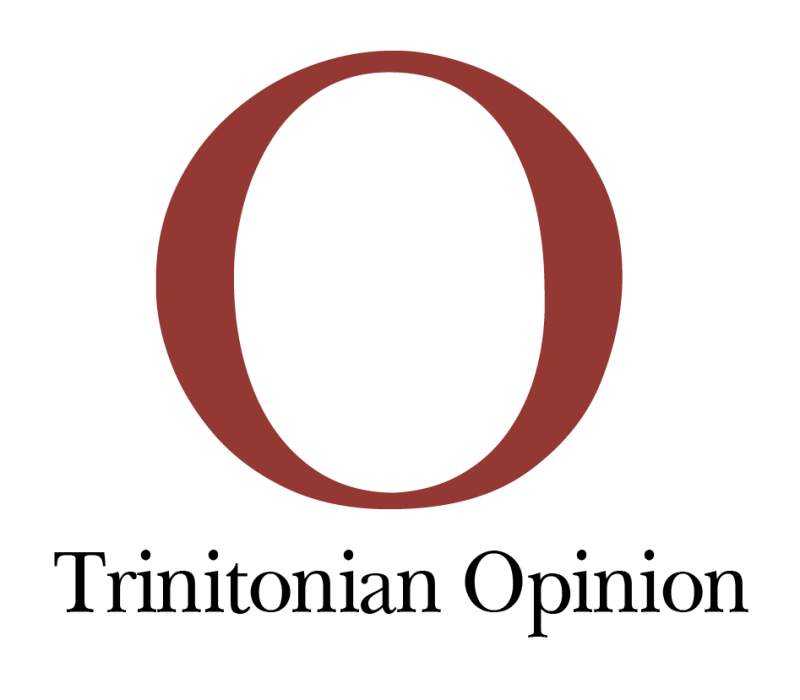In last week’s Trinitonian, Nathan Rothenbaum took it upon himself to “test his mettle against the likes of Dr. Crockett.” In his response to Dr. Crockett’s article, which reminds us all that every issue has an alternative narrative and that individuals who hold such alternative views shouldn’t be cornered into silence by politically correct, mainstream viewpoints, Mr. Rothenbaum posits that Dr. Crockett has missed the “very nature of democracy” and asks: “whose ideas are being silenced, and where is this silencing happening?” To answer Mr. Rothenbaum’s question, this silencing is occurring on our own campus and those who hold back their expressions of alternative narratives are being subtly silenced by hypocritical pronouncements. Mr. Rothenbaum’s own article is complicit in this charge because he claims to believe in the freedom of speech, but only if it resides within his lofty and progressive “limits of discourse.” But such limits that exclude alternative narratives cannot possibly be rationalized as adhering to the tenets of free speech.
The specific point of Dr. Crockett’s article was to express that there is more than one narrative that is acceptable to believe and promote in light of the charges of Islamophobia in the recent “clock scenario.” More generally, his thesis argues that there are alternative viewpoints to any controversial issue our society faces and it is almost comical to see how Mr. Rothenbaum’s veiled hypocrisy perfectly illustrates Dr. Crockett’s entire message. Now, let me drag that true meaning out of the closet.
Citizens of our great nation are free to express whatever they like without fear that the government will punish them for whatever statements they choose to make. Mr. Rothenbaum is probably correct in stating that no one is being imprisoned for what they believe or say because Americans usually feel very comfortable that the police will not break their door down over public expressions of their views. However, some private citizens (Mr. Rothenbaum included) now encourage a more subtle and sinister form of censorship that is becoming more and more prevalent in our society. Many private citizens now see the need to collectively and publicly vilify any individuals who express unpopular or “politically incorrect” statements that are no longer deemed acceptable or within the mainstream narrative’s “limits of discourse.” This includes support for traditional marriage to the universally true recognition that all lives matter, to the most recent episode of justifying the arrest of Ahmed Mohamed for bringing a suspicious object to school, and the list can go on forever.
On reading Mr. Rothenbaum’s response to Dr. Crockett’s article, it is clear that he fully embraces this new phenomenon of condemning unpopular speech as evidenced by his own quote: “no one (yet) opposes your freedom to speak, they just think your ideas are both dumb and oppressive.” By labeling alternative narratives that are expressed in the public square as “dumb and oppressive,” Mr. Rothenbaum condescendingly assumes that these ideas, which don’t fit the mainstream narrative, are the products of certain troglodytes who are too antiquated to contribute anything positive to our society, simply because they resist the politically correct narrative on the issue. The effect of this causes some individuals to self-censor themselves for fear that if they don’t, others will publicly decry their statements as oppressive, racist, homophobic, sexist, etc. On top of this, these jibes have been liberally used to discredit anyone who continues to recognize an alternative narrative. There is no easier way to discredit another person’s opinion than to convince others that he or she is a racist, a bigot or any other term for oppressor that is the current flavor of the month. But the continued onslaught of these verbal assaults leads many to self-censor once they have seen outspoken individuals’ character publicly smeared.
Mr. Rothenbaum’s own article offers up prime evidence for this new form of self-censorship. He states, “the fact that people now bite their tongue instead of openly arguing for oppression is a spiral of silence worth protecting, not changing.” Of course, the fear of being labeled as an oppressor may cause people to “bite their tongue” and not voice an alternative narrative. Mr. Rothenbaum may not have realized, but by compounding the expression of an alternative narrative with the promotion of oppressive beliefs, he is aiding the silencing of individuals with alternative viewpoints from speaking up due to their fear of being the object of such aforementioned labels. Thus, Mr. Rothenbaum may have his answer that yes, self-censorship does happen at our university, and the objects of this silencing are those who possess and/or would like to express an alternative viewpoint, which they know they cannot achieve without being denigrated for doing so. Inevitably, the easiest result for many is to self-censor, which only further contributes to the spiral of silence.
If we continue to self-censor ourselves and intimidate others into silence, we will not only lose a fundamentally important aspect of our great nation’s heritage, but we may also find that these actions will become a stable component of our culture. If politics resides downstream from culture, how soon will it be before our laws reflect the mainstream views and authorize the awesome force of government to punish or oppress those who offer a divergent opinion? Mr. Rothenbaum seems fine with this notion of “progress” as he ominously predicts, “no one (YET) (my emphasis) opposes your freedom to speak,” thus fully admitting that the suppression of speech may be on the horizon. In Mr. Rothenbaum’s envisioned future, it may not be long before any future attempt of mine to defend unpopular or alternative views must be submitted to the Trinitonian via mail, and written with pencil and paper. After all, computers are not permitted within jail cells.






